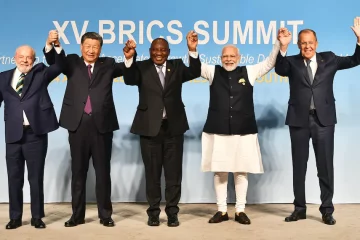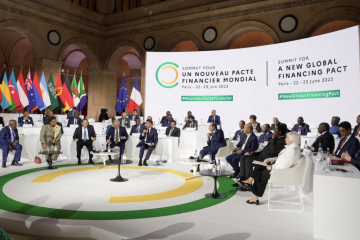
OxPol Blogcast. Politics, Re-Imagined — Displacement and the World Economy with Alexander Betts
How can we ensure that displaced people live in safety and dignity and create a policy that is sustainable at the same time? In this episode, we speak to Dr. Alexander Betts, the Leopold Muller Professor of Forced Migration and International Affairs at the Refugee Studies Centre, and the Director of the Refugee Economies Programme, both at the University of Oxford. Alexander has written extensively on the political economy of refugee protection — highlighting how displaced people can access and contribute to economies worldwide. Politics, Re-Imagined is a series by the Department of Politics and International Relations (DPIR) at the University of Oxford focused on exploring tangible and sustainable solutions to the most pressing challenges facing humanity today. Listen on:

From BRICS to BRICS+: Implications for the Group, Multilateralism, and the Global South
Introduction After World War II, the multilateral system was designed to promote international peace, drive economic growth, and ensure global cooperation. Institutions such as the United Nations, International Monetary Fund, and World Trade Organisation established alliances, treaties, and agreements with the aim of achieving shared prosperity. In recent years, however, cracks are beginning to appear within this system. The world has witnessed a sharp increase in geopolitical crises like the Russia – Ukraine war, withdrawals from treaties, trade protectionism and back-sliding democracies. The multilateral system has also failed to deliver comprehensive solutions to global issues such as COVID-19 and climate change. As the inequalities within the multilateral system become increasingly apparent, calls for change are starting to reverberate across the …

The Paris Climate Summit: A Milestone for the Global South?
International summits are vital to promoting global agreement and laying the groundwork for future international cooperation. The Summit for a New Global Financial Pact took place in Paris, co-hosted by France’s President Emmanuel Macron and Barbados’ Prime Minister Mia Mottley. The Summit, organised with the aim of promoting global unity for international financial architecture form, set out to achieve four main goals focusing on fiscal sustainability and climate change in low-income countries. Amid the worldwide increase in extreme poverty and climate disasters, these conferences provide a platform for building coalitions to resolve urgent humanitarian issues. However, there has been a marked decline in international cooperation and the success of these events. In 2022, the United Nations Climate Change Conference COP27 …









